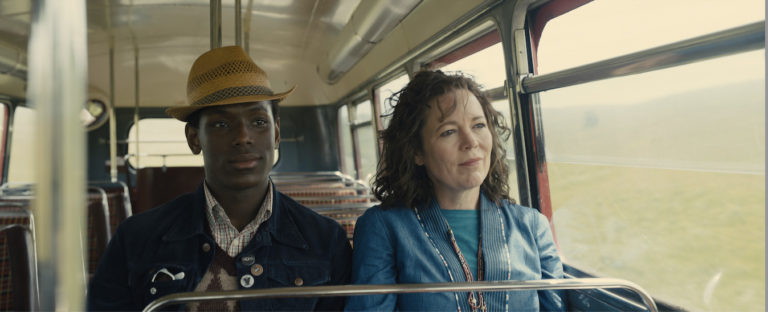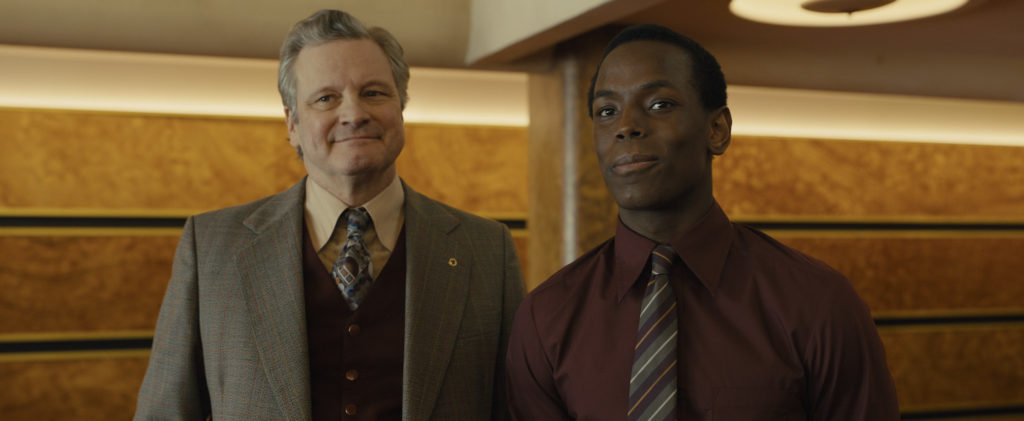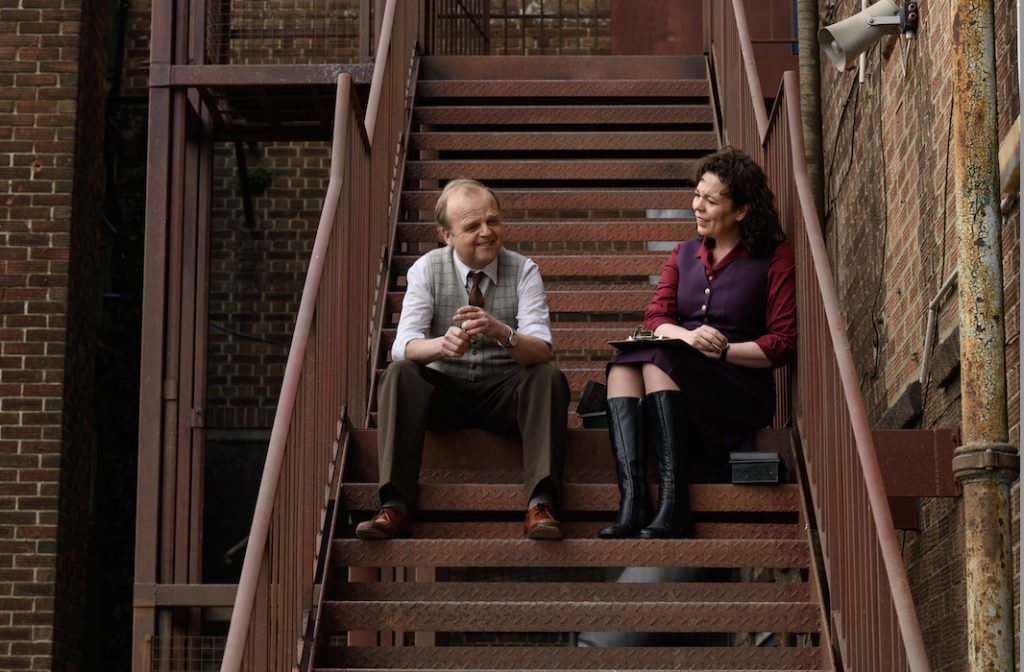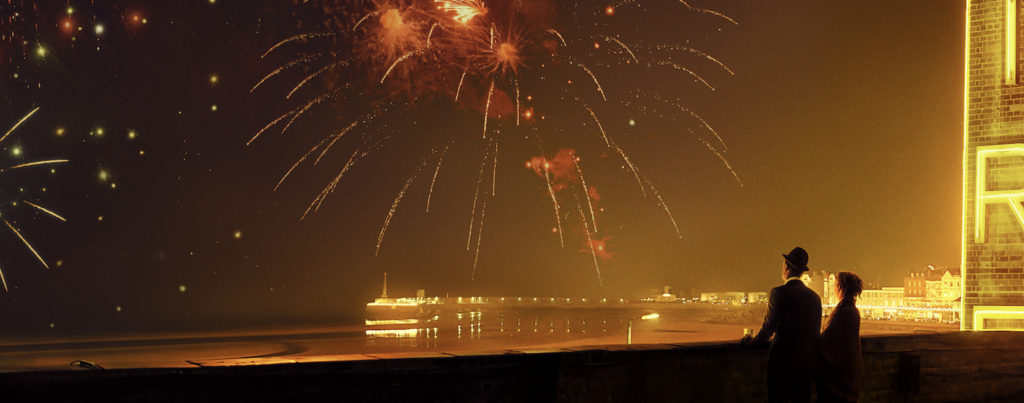
Synopsis : Set in an English seaside town in the early 1980s, EMPIRE OF LIGHT is a powerful and poignant story about human connection and the magic of cinema, from Academy Award®-winning director Sam Mendes.
Rating: R (Sexual Content|Language|Brief Violence)
Genre: Romance, Drama
Original Language: English
Director: Sam Mendes
Producer: Pippa Harris, Sam Mendes
Writer: Sam Mendes
Release Date (Theaters): Dec 9, 2022 Wide
Box Office (Gross USA): $1.1M
Runtime: 1h 59m
Distributor: Searchlight Pictures
Interview with Olivia Colman and Michael Ward
Q: The chemistry you two worked so well in the movie. Did you have chemistry from the get-go or did you have to develop it?
MW: I think we definitely had chemistry from the start and also it was developed. It wasn’t really difficult, in my opinion, anyway.
OC: I found it very difficult. We got on straightaway, and Sam [Medes, director] said he knew we would get on. He says we’re very similar; we giggle a lot, we take the work seriously, but not really ourselves, and had a really fun time on set. For me it was very nice. I got to have an affair with a man half my age.
Q: You had quite a few intense scenes. For example, when Stephen visits Hilary at the apartment, can you shake that off right away or does that linger with you?
OC: It lingers for a bit. You have to do take after take so you have to try and stay in that place. But I felt it was a very supportive environment, and Micheal was there, and you keep quiet while you’re trying to stay [in the moment]. But then as soon as they go “We’ve got it”, [deep sigh] — everyone has a hug and it’s all okay, and a cup of tea. It’s cathartic, you can get so much out. You don’t have to take it home.
Q: Olivia, Hilary is partly inspired by the director’s mother’s mental illness. Did you feel you have the responsibility to portray and deal with an important mental issue?
OC: I felt enormous responsibility portraying Sam’s mum. As I said before, it was a very supportive environment, and Sam is the gentlest, very emotionally intelligent person. He makes you feel like there’s nothing you can do wrong, and so you’re able to feel free and to really go for it. I had him there all the time to say “What’s it like watching a woman on the trajectory up and the coming down, and the before lithium and the after lithium”. Because he saw it every day of his life all through his childhood. He was my best researcher, so I felt safe.
Q: What do you remember about the period of the film? The Eighties, the music, and so forth?
OC: In 1981 I was seven, so there’s not an awful lot I remember about that. My memories of the Eighties come in a few years later. I do remember my granddad having a car like some of the cars that went outside, things like that. I realized how noisy those cars were and how smelly they were. I remember generally the colors, sort of beiges and browns. But an awful lot of it I don’t really remember. I was busy riding my bike and getting muddy at that time.

Q: The DP, Roger Deakins, collaborated with Mendes on this film. What was their collaboration like on the set?
MW: That was something that I really enjoyed watching, actually. From the first day, Roger came down when we were doing rehearsals. We were in London rehearsing this one scene, and we’d been doing it all day, all day. And then at lunch Roger came down and he said to Sam, “This isn’t going to work because” this, this and this. Sam said “Oh,” and he changed it, changed everything around. But to see that Roger had that intel straightaway, just from the setup that he saw, was amazing, and you could see that these two people trusted each other. And when you’re seeing that, it allowed me to trust them, so that was really exciting. The whole process was like that, seeing them working in a collaborative manner, it was great.
OC: Sam’s [method] is they work out every shot before they even start filming. They had like, almost a sign language — a nod or a [gestures]. They knew each other so well and trusted each other. Yeah, exactly, it was beautiful.
Q: One of the main themes of this film is the magic of cinema. Could you both take us back to the film that got you to come into the magic of cinema? What point in your life was that?
MW: For me, “Step Up 2 The Streets” [dir. Jon M. Chu, 2008] is one of the earliest ones I can remember. When we were younger, cinema was our entertainment. So we used to go there as something to do on non-school uniform days — like Friday, for example, would be the day that you would not wear a uniform and we’d all go to our local cinema. Me and my friends, we watched a film and we’d come out all dancing, we’d all pick the different moves to do. It was fun. I feel that when you have an experience like that, obviously it affects you in some way. We had fun all the way, on the bus, all the way home. So this film, I thought yeah, this definitely had an impact on us.
OC: I remember the first film I saw when I was tiny, my granny took me to see “Bambi” — which wasn’t a great experience. She had to take me out of the cinema quite early on.
Q: When will Bambi’s mother die?
OC: I know! It was a drawing. They could have not drawn that. They didn’t have to do it that way. It was very upsetting. My granny had to take me home, and I think I was upset with the cinema for a long time afterwards. But that was a moment when it really impacted me, even though it was in a really upsetting way. And a huge screen. I think in some way a fascination started then. But my tastes changed as the years went on, and I discovered art films in my teens and then I was hooked.
Q: The social issues that defined are quite subtly handled and eventually arrived at the door of your community in a very shocking way. Was that part of the draw for you on the page for both of you, and what did you find out about that time in the course of further research?
MW: The first part of your question, about issues arriving at the door: for me, it wasn’t something that I was super-aware of in terms of the social stuff. It was just feelings that I thought were necessary for the character to have, because he was such a good character. He’s written as a very good character. So the fact that he has this struggle in terms of this exterior and this society, I felt was really important.
OC: I agree. Micheal’s character has to experience those hideous things outside while his battle is within. But also what’s extraordinary is you look at this in the Eighties, a time of great physical upheaval and racial upheaval, and you think, we’ve come a long way. But then you realize, oh no, we really haven’t.
Sam was writing it during the Black Lives Matter movement and everything was happening, and you realize we haven’t come far enough by a long shot. I thought that was beautifully done, but we need to have done more. We should have done more by this point. It’s interesting to go to the Eighties and realize the social upheaval. Sexism we’re doing slightly better with now, but there’s a lot that still needs to be sorted out. We’re talking about mental health more, but still not enough. It’s interesting to look at that film set in 1981 and how we are now. And sadly, we are not quite far enough along.

Q: This film seems to be trying to say something about both culture and humanity in many ways. What are your thoughts about what this movie is about?
MW: For me, the film is about two people who are lonely and drawn together by that loneliness through connection. It really shows the importance of human connection alongside all of the other themes that run through it, including mental health, racism, sexism, feminism.
OC: I can’t really improve on what the film’s about. It’s two lost people who see each other: not what color they are, not what age they are, but they find each other. From Hilary’s point of view, it’s the most loving relationship she has. He’s the only one who comes to see her when she’s at her lowest moments. There’s two people dealing with an inside battle and an external battle, and they find each other. And there are other things, obviously.
It’s not just about us.
Q: Micheal, in comparing Stephen to Jamie in “Top Boy”, both are very mature for their age even though they are from different environments. Do you have any thoughts on going from playing Jamie to Stephen?
MW: The maturity is something I would really like to bring to my performances. With the characters that I played, they’ve had to grow up fast. Jamie had to grow up fast because his parents died and he had to look after his little brother. So it’s just what it is, it’s the environment.
With Stephen, he’s obviously in college and stuff, but he had to grow up first because there’s no one in his society that’s like him and he’s going through these situations in his life where it’s not the norm. So I feel like that’s why they mature quicker. But I think that’s the main similarities.
Other than that, they are quite different in terms of how they speak, how they maneuver, and how they handle different situations. Jamie in his situation moved in terms of racism, [this] is going to be completely different to how Stephen handled it. It’s good to explore those things as well, and try to understand what that would have been like back then and also what that would be like now. Maybe I’ll play a character that’s not as mature if there’s no external impact on them.
Q: Micheal, even though you were not around in the Eighties, what aspects of that era did you feel connected with?
MW: For me, what I think I connected with for the Eighties was the impact of music. All that music was so important back then, especially because it gave people something to believe in.
OC: I agree.
MW: You know, when Stephen is talking about the specials, and step to the beat, that is two genres coming together [and] races coming together to make music.
Now, that’s normal. I really saw that back then, the impact that music has had, even on people’s ideologies, which I think was super-important. It made me start looking into other people more, like Bob Marley and [others] and what they had to say through their music. But understanding that was the special part of the process.
And also the movies as well, obviously — the impact they had on people — and the type of movies that were getting made. It’s really exciting how much we’ve moved away from the Eighties but also how similar it is.
Q: Olivia, what is your opinion of Hilary’s mental issues in this film? How did you approach that?
OC: For one, I was really honored to try to portray what Hilary goes through. It was a little bit scary, because Hilary is loosely based on Sam’s mum, so I didn’t want to let him down. Or let anyone down who’s seen a loved one go through it, or had experienced it themselves. In the Eighties, it was definitely a taboo subject to talk about mental health issues. Now, we have come a long way, but it’s still not spoken about enough.
Sam was asked this question [and said] “If you came out of hospital having had cancer treatment, people would say “How are you?” But if you come out of hospital having been in a mental institution, people would avoid the subject. They wouldn’t ask you how you are. And that’s the step we need to get beyond and to go, “How are you? It’s okay. You can talk about it.” There shouldn’t be shame, because it’s nobody’s fault.
So I felt honored to be able to portray this, and I hope even some conversation is started about it.
Q: Thank you.

Check out more of Nobuhiro’s articles.
Here’s the trailer of the film.

